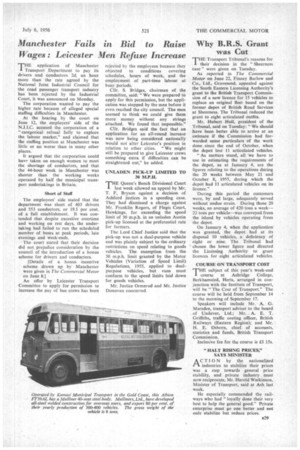Manchester Fails in Bid to Raise Wages : Leicester Men Refuse Increase
Page 39

If you've noticed an error in this article please click here to report it so we can fix it.
THE application of Manchester Transport Department to pay its drivers and Conductors 2d. an hour more than the rate agreed by the National Joint Industrial Council for the road passenger transport industry has been rejected by the Industrial Court, it was announced on Monday. The corporation wanted to pay the higher rate because of alleged special staffing difficulties in Manchester. At the hearing by the court on June 12, the employers' side of the NJ IC. accused the corporation of a "categorical refusal fully to explore the labour market," and claimed that the staffing position at Manchester was little or no worse than in many other places. It argued that the corporation could have taken on enough women to meet the shortage of conductors, and that the 44-hour week in Manchester was shorter than the working weeks operated by half the municipal transport undertakings in Britain.
Short of Staff
The employees' side stated that the department was short of 403 drivers and 553 conductors, or 19.1 per cent. of a full establishment. It was contended that despite excesgive overtime and working on rest days, the undertaking had failed to run the scheduled number of buses at peak periods, late evenings and week-ends. The court stated that their decision did not prejudice consideration by the council of the introduction of a bonus scheme for drivers and conductors. [Details of a bonus incentive scheme drawn up by Manchester were given in The Commercial Motor on June 8.]
An offer by Leicester Transport Committee to apply for permission to increase the pay of bus crews has been
rejected by the employees because they objected to conditions covering schedules, hours of work, and the employment of part-time labour at busy periods. Cllr. S. Bridges, chairman of the committee, said: "We were prepared to apply for this permission, but the application was stopped by the men before it even reached the city council. The men seemed to think we could give them more money without any strings attached. We found that impossible." ClIr. Bridges said the fact that an application for an all-round increase was now being considered nationally would not alter Leicester's position in relation to other cities. "We might still be prepared to give Leicester crews something extra if difficulties can be straightened out," he added.
UNLADEN PICK-UP LIMITED TO 30 M.P.H.
THE Queen's Bench Divisional Court last week allowed an appeal by Mr. T. F. Bryson against a decision of Ashford justices in a speeding case. They had dismissed a charge against Mr. Franklin Rogers, of Aegis Court, Hawkinge, for exceeding the speed limit of 30 m.p.h. in an unladen Austin pick-up licensed at the preferential rate for farmers. The Lord Chief Justice said that the pick-up was not a dual-purpose vehicle and was plainly subject to the ordinary restrictions on speed relating to goods vehicles. The exemption from the 30 m.p.h. limit granted by the Motor Vehicles (Variation of Speed Limit) Regulations, 1955, applied to dualpurpose vehicles, but vans must conform to the speed limits laid down for goods vehicles.
Mr. Justice Ormerod and Mr. Justice Donovan concurred. Why B.R.S. Grant was Cut
THE Transport Tribunal's reasons for their decision in the "Sheerness case" were given on Tuesday. As reported in The Commercial Motor on June 22, Finney Barlow and Co., Ltd., Gravesend, appealed against the South Eastern Licensing Authority's grant to the British Transport Commission of a new licence for 15 vehicles to replace an original fleet based on the former depot of British Road Services at Sheerness. The Tribunal reduced the grant to eight articulated outfits.
Mr. Hubert Hull, president of the Tribunal, said on Tuesday: "We should have been better able to arrive at an estimate if the Commission had forwarded some particulars of the work done since the end of October, when the depot lost 11 articulated vehicles.
"As matters stand, all we have to use in estimating the requirements of the depot, as at January 4, are the figures relating to the operations during the 20 weeks between May 21 and October 8, 1955, during which the depot had 11 articulated vehicles on its licence." During this period the customers were, by and large, adequately served without undue strain. During those 20 weeks, an average of 420 tons a week-22 tons per vehicle—was conveyed from the island by vehicles operating from the depot. On January 4, when the application' was granted, the depot had at its disposal 10 vehicles, a deficiency of eight or nine. The Tribunal had ' chosen the lower figure and directed the Licensing Authority to grant licences for eight articulated vehicles.
COURSE ON TRANSPORT COST
'THE subject of this year's week-end 1 course at Ashridge College, Berk harristed, Herts, arranged in conjunction with the Institute of Transport, will be "The Cost of Transport." The course will be held from September 14 to the morning of September 17. Speakers will include Mr. A. G. Marsden, transport adviser to the board of Unilever, Ltd.; Mr. A. E. T. Griffiths, traffic costing officer, British Railways (Eastern Region); and Mr. FL E. Osborn, chief. of accounts, statistics and funds, British Transport Commission.
Inclusive fee for the course is 13 15s.
"HALT RISING PRICES," SAYS MINISTER
I-1
ACTION by the nationalized
industries to stabilize their prices was a step towards general price stability, and private industry must now reciprocate, Mr. Harold Watkinson, Minister of Transport, said at Ash last week. He especially commended the railways who had " loyally done their very best to help the general good." Private enterprise must go one better and not only stabilize but reduce prices.
























































































































